When it comes to oven cleaners, there are a lot of myths and misconceptions. People often wonder what is the effect of oven cleaner on kitchen countertops. Some people believe that oven cleaner can damage your countertops, while others think that it’s the best way to clean them. In this comprehensive guide, we will dispel the myths and give you some useful tips on how to deal with the damage on your kitchen countertops safely and effectively.
Why Would One Want to Resort To Using Oven Cleaners on Kitchen Countertops?
Oven cleaners are typically harsh chemicals that are used to clean ovens. They can be in liquid, gel, or aerosol form and usually contain caustic soda (also known as sodium hydroxide) or lye. While these chemicals are effective at cleaning ovens without any scrubbing, they can also be dangerous if not used properly.
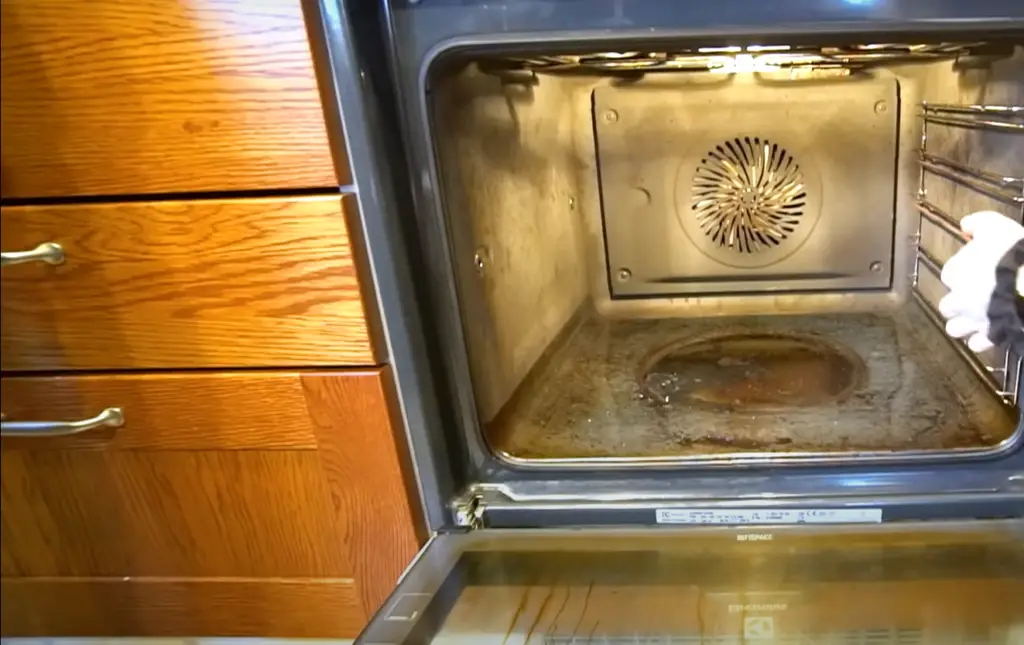
There are a few reasons that one might want to use oven cleaners on their kitchen countertops. The first is that it can be a very effective way to clean grease and grime. If the countertop is particularly dirty, then some people might resort to an oven cleaner as a solution.
In a similar way, another reason to use an oven cleaner on kitchen countertops are stubborn stains that won’t come out with regular cleaning products. Oven cleaners can sometimes loosen these stains so that they can be wiped away more easily. [1]
Why Oven Cleaners Are Dangerous to Kitchen Countertops?
However, there are also some significant risks associated with using oven cleaners on kitchen countertops, mainly because of the chemicals that they contain. Let’s take a look at some of the chemicals it includes.
Lye
Lye is one of the most common chemicals found in oven cleaners. It’s a strong alkaline substance that can cause serious burns if it comes into contact with your skin. In fact, lye is so corrosive that it’s often used to dissolve hair and grease from clogged drains and decompose organic matter.
Because it’s so aggressive, it’s pretty clear as to why you wouldn’t want to use an oven cleaner containing lye on your kitchen countertops.
Monoethanolamine
One of the most common chemicals found in oven cleaners is monoethanolamine, or MEA. This chemical is used in a variety of cleaning products because it’s effective at cutting through grease and removing stains. However, it can also be dangerous if it’s not used properly.
It can also cause irritation to your skin and eyes if you come into contact with it. Inhaling MEA fumes can also be harmful, so it’s important to make sure that you’re using the cleaner in a well-ventilated area.
Another thing to keep in mind is that MEA is flammable, so you should never use it near an open flame.
Methylene Chloride
Some oven cleaners contain methylene chloride, which is a carcinogenic chemical. This means that it can increase your risk of cancer. Methylene chloride is also a central nervous system depressant, which means it can cause dizziness, headaches, and nausea. Inhaling methylene chloride can also lead to liver damage and kidney damage. [2] ,[3]
Risks of Using Oven Cleaner on Kitchen Countertops
Now that we’ve looked at the main factors that make oven cleaners dangerous, let’s take a more detailed look at the risks associated with using them on kitchen countertops.
They pose risks to your health
The first and most obvious risk is to your health. As we’ve seen, the chemicals in oven cleaners can cause burns, blindness, and damage to your digestive and respiratory systems.
The fumes from the chemicals can trigger an attack, so it’s important to make sure that you’re in a well-ventilated area.Another risk is that the chemicals in oven cleaners can easily contaminate your food. If there’s any residue left on your countertops after you’ve used an oven cleaner, it can easily come into contact with your food. This could potentially lead to poisoning.
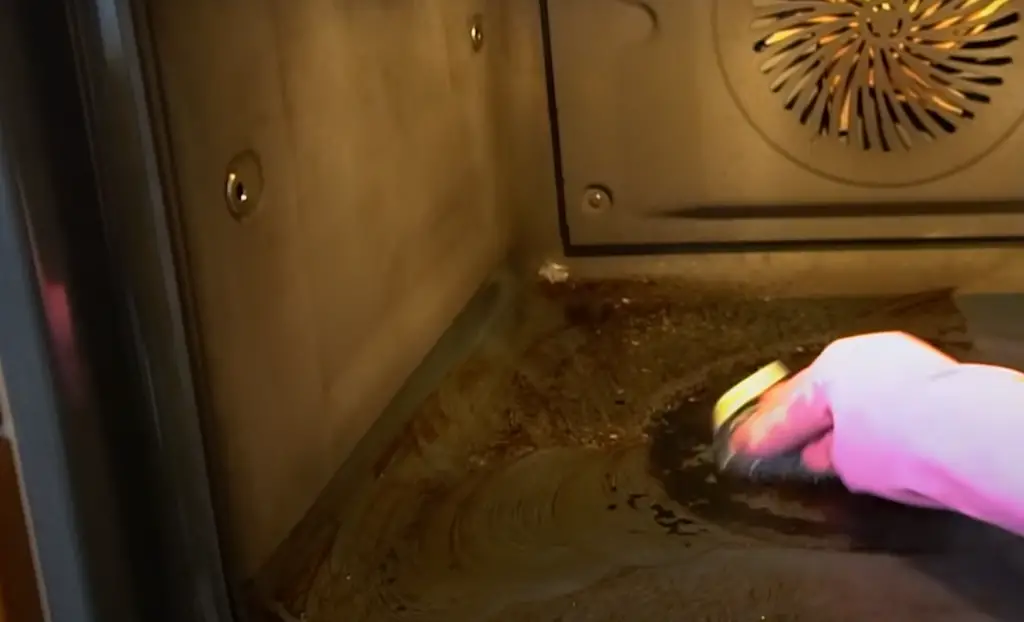
It’s also worth noting that some of the ingredients in oven cleaners are considered carcinogens. This means that they could increase your risk of developing cancer if you’re exposed to them on a regular basis.
They can cause a variety of damage to countertop surfaces
Oven cleaners are very caustic substances. Because of that, it can eat away at surfaces, which is why it’s such an effective cleaning agent. However, this also means that there is a risk of damage to your countertops if you use oven cleaner on them.
There are a few main risks associated with using oven cleaner on kitchen countertops.
It causes discoloration
Oven cleaner is very harsh and can cause discoloration and fading of your countertops. This is because it removes the top layer of your countertop, which exposes the lower layers. The lower layers are usually a different color than the top layer, so you end up with an uneven appearance, like white spots and blotches.
If you apply an oven cleaner to the aluminum countertop, it will cause the surface to turn black. This is because the chemicals in the cleaner react with the aluminum to create a new compound.
Discoloration is one of the most common risks associated with using oven cleaner on kitchen countertops. If you don’t want to risk discoloring your countertops, it’s best to avoid using this cleaning agent altogether.
It can wipe away the finish on countertop
Because oven cleaner is so abrasive, it can also wipe away the finish on your countertop.If you have a countertop with a protective coating, such as a sealant or varnish, oven cleaner can remove that coating.
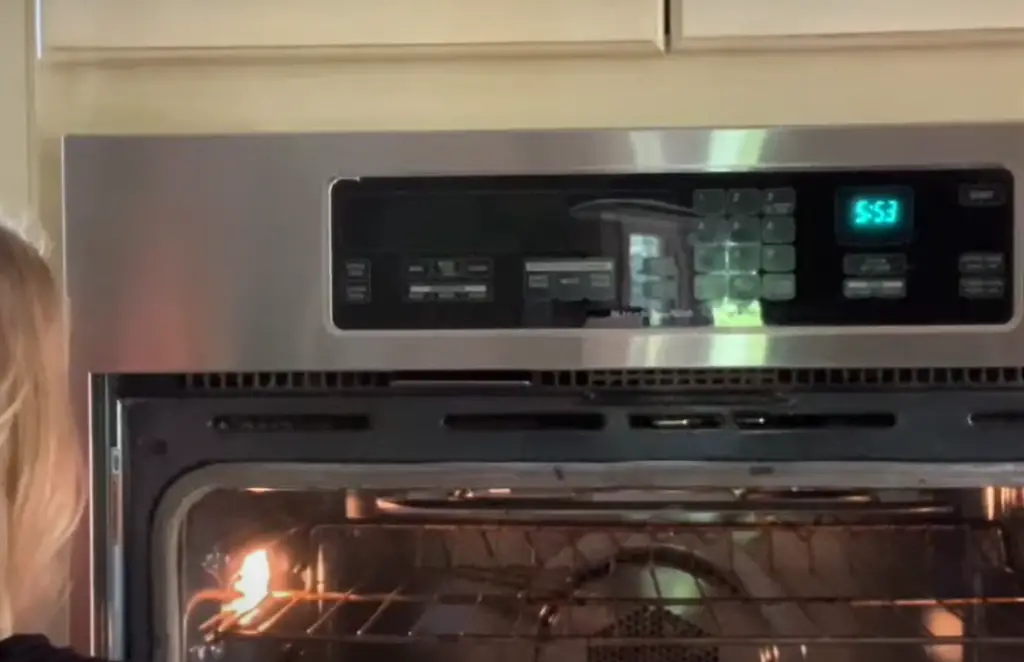
This means that your countertop will be more susceptible to scratches, stains, and other damage. In some cases, it can even become sticky to the touch. So if you want to keep your countertop in good condition, it’s best to avoid using oven cleaner on it.
It triggers corrosion
Another risk of using oven cleaner on kitchen countertops is that it can trigger corrosion on metal countertops. The reason is simple: the caustic nature of the cleaning agent eats away at the surface of your countertop, which can lead to rust and other forms of corrosion.
Corrosion is a serious issue because it can weaken the overall structure of your countertop and can cause it to become brittle and eventually break.
Usually, manufacturers will print a “Corrosive” warning on the label of oven cleaners to indicate that this is a risk. If you see this warning, it’s best to avoid using that particular product on your non-corrosion resistant countertops.
In general, it’s best to avoid using oven cleaner on kitchen countertops. If you do decide to use it, be sure to take the proper precautions and follow the instructions carefully. [1], [2], [4], [5]
How to Fix Oven Cleaner Stains
But what if you’ve already used oven cleaner on your countertop and you’re now dealing with the consequences? In this section, we’ll take a look at how to fix some of the most common problems associated with using oven cleaner on kitchen countertops.
Use vinegar to remove streaks and stains
If you have streaks or stains on your countertop, one of the best things you can do is to use vinegar to remove them. Vinegar is a natural acidic cleaning agent that’s gentle enough to use on most surfaces.
Frequent use of this method is not recommended for granite and natural stone countertops as the acidic nature of vinegar can damage the polyurethane sealant that protects them.
To use vinegar to remove streaks and stains, simply mix a little of white vinegar and water in a bowl. Then, dip a clean cloth into the mixture and use it to wipe away the streaks and stains.
You may need to repeat this process several times before the streaks and stains are completely gone. However, if you’re patient, you should be able to get rid of them without too much trouble. Once you’ve removed the streaks and stains, be sure to wipe your countertops down with a clean, damp cloth to remove any residue.
Use baking soda and water to remove discoloration
If you have a stained granite countertop, you will want to use a less acidic solution to remove the discoloration. Baking soda is a great alternative because it’s gentle enough to use on most surfaces without damaging them.
To use baking soda to remove stains, simply mix baking soda and water to create a paste. Then, use a clean cloth to apply the paste to the stained area, cover it with a plastic wrap and let it sit for at least a day before wiping it away.
Make sure to test baking soda paste on a small inconspicuous area of your countertop first to ensure it doesn’t damage the surface.
Buff the surface with beeswax
Wooden countertops can be particularly difficult to clean because they’re so porous. And as you may know, aggressive cleaners can easily penetrate the surface of a wooden countertop and cause permanent damage.
If you’ve used an oven cleaner on your wooden countertop, one of the best things you can do is to buff the surface with beeswax. Beeswax is a natural wax that’s gentle enough to use on most surfaces.
It will help to protect your countertop from future damage, remove the stains and it will also provide it with a nice shine. To use beeswax, simply rub a small amount onto the surface of your countertop with a clean cloth.
Alternative Ways to Clean kitchen Countertops
If you’re looking for an alternative to oven cleaner, there are a few other options you can try. The best option will depend entirely on the material of your countertop.
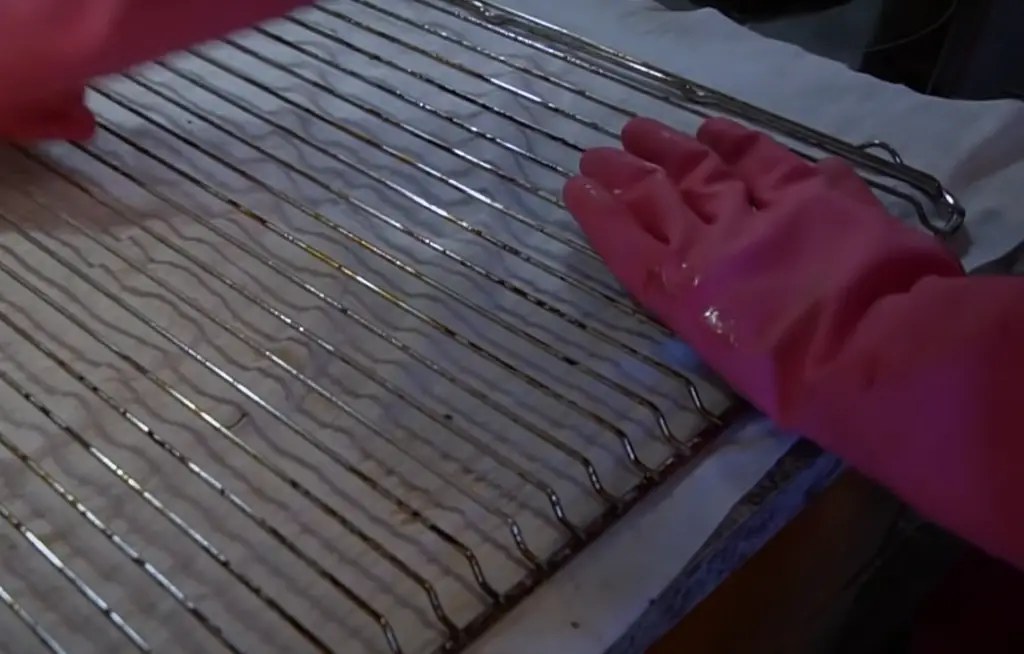
For example, if you have a wooden countertop then you would want to use a non-abrasive cleaner like a warm water and vinegar solution. After cleaning the surface with this solution, be sure to dry it thoroughly to avoid any water damage.
Simply apply the solution to the surface with a clean microfiber cloth and then wipe it away. You should also rinse the area afterwards with clean water.
The same method can be used for tile and stainless steel countertops. This may not be as effective for tougher stains, but it’s a good place to start. If you have some annoying greasy stains that won’t get off at all however, you may want to purchase an appropriate cleaner for each surface instead. Be sure to follow the manufacturer’s instructions carefully to avoid damaging your countertop.
Formica countertops can be cleaned with an all purpose cleaner or again, a soapy solution. Just make sure you don’t use any abrasive cleaners or scrubbers on this type of surface as it can scratch and damage the material. [1], [2], [4]
Effect of Oven Cleaner on Kitchen Countertops
This table presents a comparison of various indicators to evaluate the effect of oven cleaner on different types of kitchen countertops. The data is measured in the imperial system.
The table provides information on three common types of kitchen countertops: laminate, granite, and quartz. Four indicators are considered to assess the effect of oven cleaner on these surfaces: color fading, surface damage, staining, and overall appearance. The indicators are rated on a scale of 1 to 5, with 1 being no effect and 5 being severe effect. The higher the rating, the more significant the impact of the oven cleaner on the countertop material.
| Countertop Type | Color Fading | Surface Damage | Staining | Overall Appearance |
|---|---|---|---|---|
| Laminate | 2 | 3 | 1 | 2 |
| Granite | 3 | 2 | 1 | 3 |
| Quartz | 1 | 1 | 1 | 1 |
In this table, we can observe the ratings for each countertop type and indicator. For color fading, laminate and granite receive ratings of 2 and 3, respectively, indicating a moderate effect. Quartz, on the other hand, shows a rating of 1, suggesting minimal color fading. Surface damage is rated at 3 for laminate and 2 for granite, indicating moderate impact, while quartz shows the lowest rating of 1, indicating no surface damage. All three countertop types show minimal staining, as they receive a rating of 1. Finally, the overall appearance ratings for laminate, granite, and quartz are 2, 3, and 1, respectively, indicating a relatively moderate impact on the appearance for laminate and granite, while quartz remains unaffected.
Please note that the ratings provided are for illustrative purposes only and may not represent the actual effect of oven cleaner on kitchen countertops. It is always recommended to refer to the specific manufacturer’s guidelines and conduct proper testing before using any cleaning products on countertops.
FAQ
Does oven cleaner lighten granite?
Granite is a natural stone, so it can be affected by harsh chemicals. Oven cleaner is quite toxic, so it’s not recommended that you use it on your granite countertops. Stone counters are pretty resistant to the damage caused by oven cleaners, but it’s still not a good idea to use it on them. Not only will oven cleaners cause granite to dull after being constantly exposed to the chemicals, but they will also strip away the sealant that protects it.
How do you remove oven cleaner from granite?
Oven cleaner can be difficult to remove from granite, as it is a porous material. You will need to use a gentle cleaning agent, like baking soda and avoid scrubbing the area. Be sure to rinse the area well afterwards to avoid any damage to your countertop.
What is the effect of oven cleaner on kitchen tops?
In general, oven cleaners should not be used on kitchen countertops. The chemicals in these cleaners can penetrate the surface and cause permanent damage. The damage can range from etching and dulling the surface to stripping the protective layer, making the countertop more vulnerable to damage and stains.
Can oven cleaner damage kitchen countertops?
Oven cleaner can potentially damage kitchen countertops, especially if they are made of sensitive materials such as marble, limestone, or some types of synthetic materials. The strong chemicals in oven cleaner can cause discoloration, etching, or surface damage to these materials.
What are the potential effects of oven cleaner on laminate countertops?
Oven cleaner can have adverse effects on laminate countertops. The harsh chemicals in oven cleaner can strip the protective coating on laminate surfaces, leading to discoloration, fading, or even delamination. It is important to avoid using oven cleaner on laminate countertops to prevent damage.
Is it safe to use oven cleaner on quartz countertops?
It is generally not recommended to use oven cleaner on quartz countertops. Quartz is a durable and non-porous material, but oven cleaner contains strong chemicals that can cause discoloration or damage the resin used to bind the quartz particles together. It is best to use mild, non-abrasive cleaners specifically formulated for quartz surfaces.
Can oven cleaner harm granite countertops?
Oven cleaner can potentially harm granite countertops. Granite is a porous natural stone, and the chemicals in oven cleaner can seep into the pores, causing stains, discoloration, or etching. It is important to avoid using oven cleaner on granite and instead use cleaners specifically designed for natural stone surfaces.
What should I do if oven cleaner accidentally spills on my kitchen countertop?
If oven cleaner accidentally spills on your kitchen countertop, it is crucial to act quickly. Immediately wipe away the spilled cleaner using a clean, damp cloth or sponge. Rinse the area thoroughly with water to remove any residue. If the spill has caused damage or discoloration, you may need to consult a professional for countertop repair or refinishing.
Are there alternative cleaners that can be used on kitchen countertops?
Yes, there are alternative cleaners that can be used on kitchen countertops. For most countertop materials, including granite, laminate, quartz, and solid surface, mild dish soap and water can effectively clean the surface. There are also specific cleaners available for each type of countertop material. Always check the manufacturer’s recommendations for the best cleaning products to use.
Can oven cleaner damage stainless steel countertops?
Oven cleaner can potentially damage stainless steel countertops if left on the surface for an extended period or used incorrectly. Stainless steel is generally durable, but the harsh chemicals in oven cleaner can cause discoloration, pitting, or etching. It is important to follow the manufacturer’s instructions and avoid leaving oven cleaner on stainless steel countertops for prolonged periods.
What are the effects of oven cleaner on butcher block countertops?
Oven cleaner should not be used on butcher block countertops. The chemicals in oven cleaner can penetrate the wood and cause stains, discoloration, or even damage the protective finish. Instead, butcher block countertops should be cleaned with a mild soap and water solution and periodically treated with food-grade mineral oil or a specific butcher block conditioner.
Can oven cleaner be safely used on ceramic tile countertops?
Oven cleaner can be used on ceramic tile countertops, but caution should be exercised. While ceramic tiles are generally resistant to the chemicals in oven cleaner, the grout lines between the tiles can be more sensitive. It is advisable to avoid getting oven cleaner on the grout, as it can cause discoloration or weaken the grout over time. Wipe away any spills or splatters from the grout promptly.
Is it safe to use oven cleaner on concrete countertops?
Oven cleaner should not be used on concrete countertops. Concrete is a porous material, and the strong chemicals in oven cleaner can cause discoloration, etching, or damage to the sealer or stain used on the concrete surface. Instead, clean concrete countertops with a mild, pH-neutral cleaner specifically formulated for concrete surfaces.
What precautions should I take when using oven cleaner near my kitchen countertops?
When using oven cleaner near kitchen countertops, it is important to take precautions to prevent accidental damage. Place protective coverings or towels over the countertops to shield them from any potential drips or spills. Ensure good ventilation in the kitchen area to minimize the buildup of fumes. Always follow the instructions on the oven cleaner product and use appropriate protective gloves and eyewear.
How can I protect my kitchen countertops from potential oven cleaner damage?
To protect kitchen countertops from potential oven cleaner damage, it is best to avoid using oven cleaner directly on the surface. Instead, use mild, non-abrasive cleaners recommended for the specific countertop material. Promptly clean up any spills or splatters to prevent prolonged exposure to the chemicals. Regularly maintain and seal natural stone countertops to enhance their resistance to stains and damage.
Useful Video: Super easy oven cleaning tutorial | FAILSAFE
Conclusion
Oven cleaners are an excellent way to deal with stubborn grime in ovens, but what about their effects on kitchen countertops? Because they contain aggressive and toxic chemicals, oven cleaners can harm not only your health, but also the surface of the countertops. Namely, oven cleaners can remove the protective coating that keeps your countertop looking shiny and new; they can cause the material to dull; and they can leave behind stains and streaks. They certainly can be used to clean countertops, sure but if you’re looking for a safe and effective way to clean your oven, consider using safer alternatives like vinegar, lemon juice, or baking soda. Thanks for reading!
References:
- https://www.caesarstoneus.com/blog/what-is-the-effect-of-oven-cleaner-on-kitchen-countertops/
- https://countertopadvisor.com/what-is-the-effect-of-oven-cleaner-on-kitchen-countertops/
- https://igozen.com/toxin-free-oven-cleaners-part-3-monoethanolamine-mea/
- https://kitcheninfinity.com/what-is-the-effect-of-oven-cleaner-on-kitchen-countertops/
- https://knbcabinet.com/what-is-the-effect-of-oven-cleaners-on-countertops/

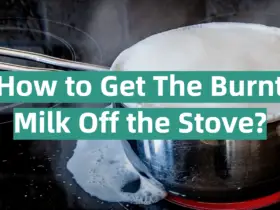
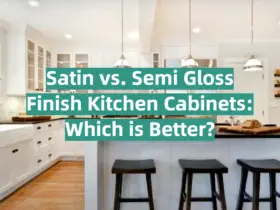
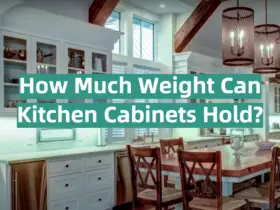
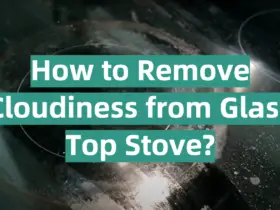
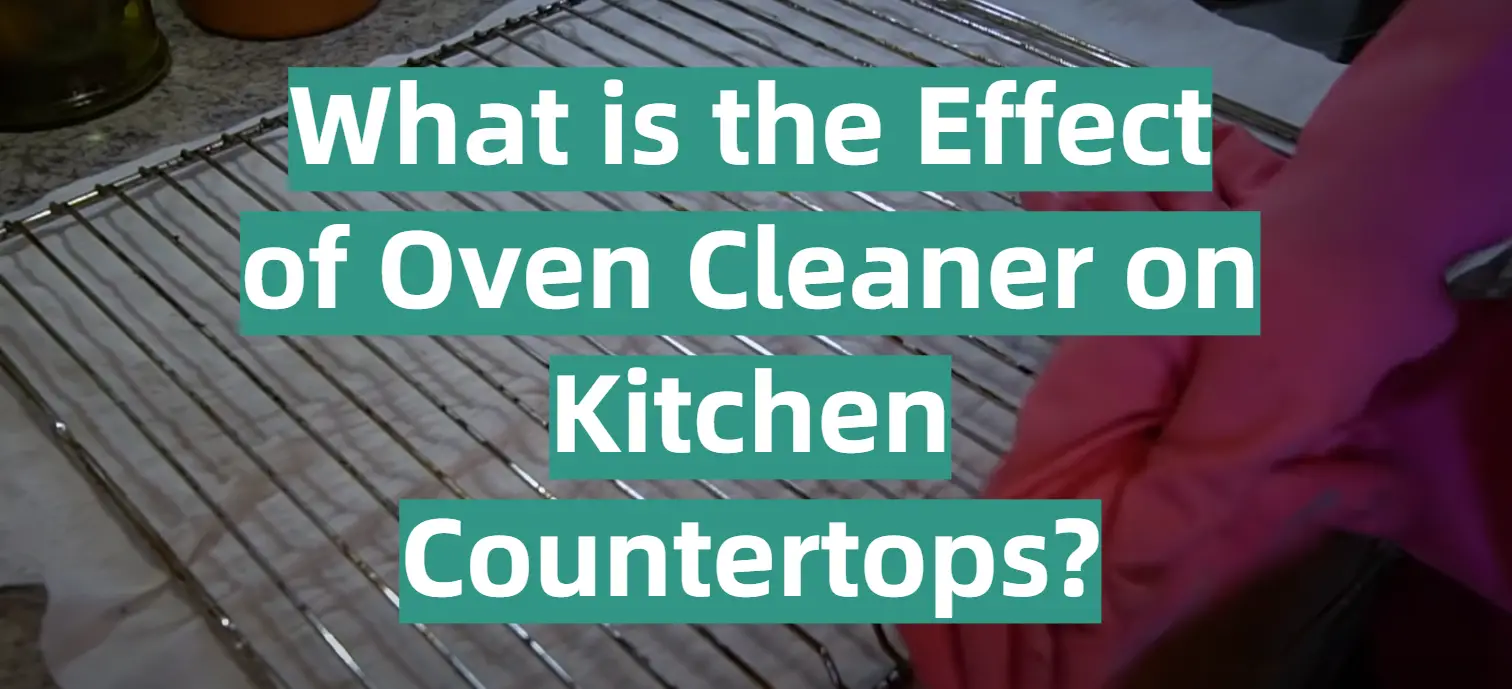

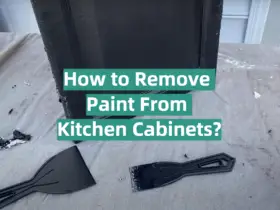
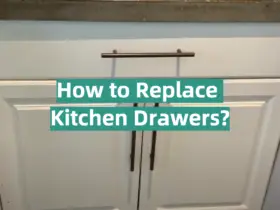
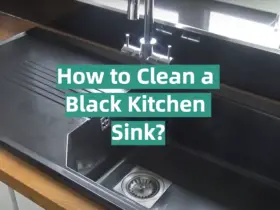
Leave a Reply